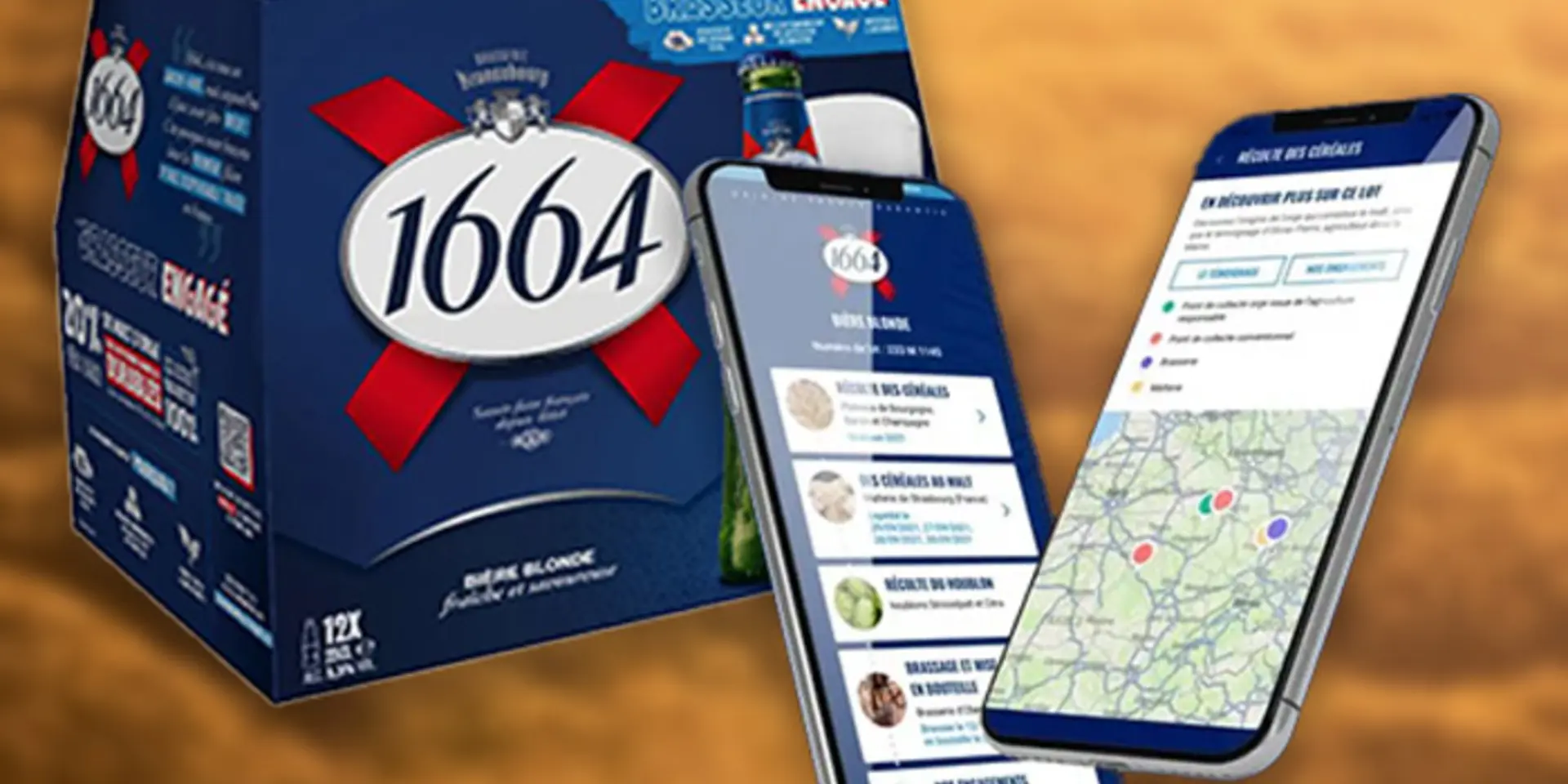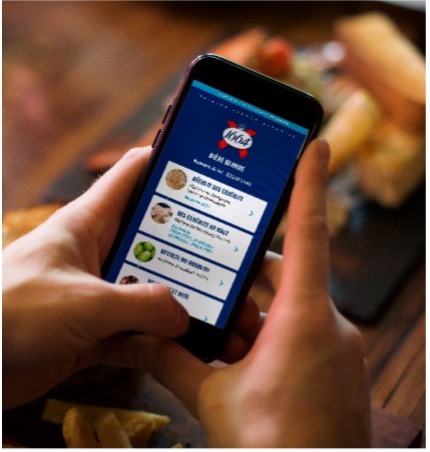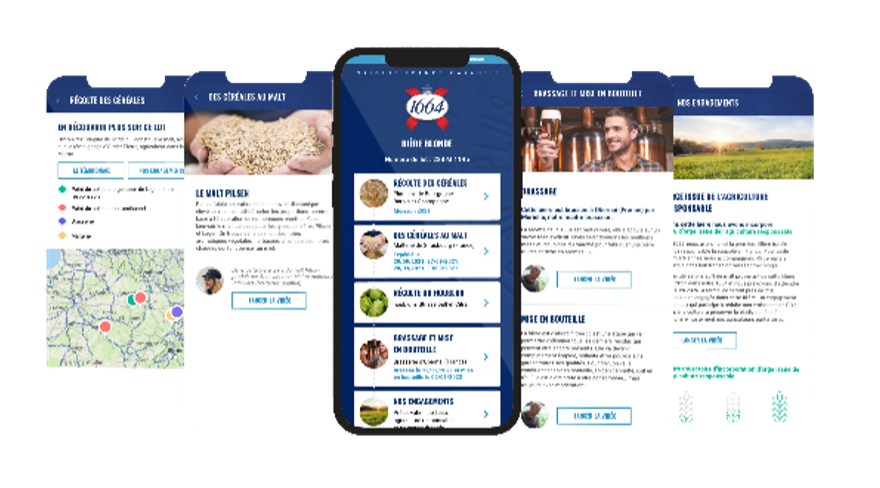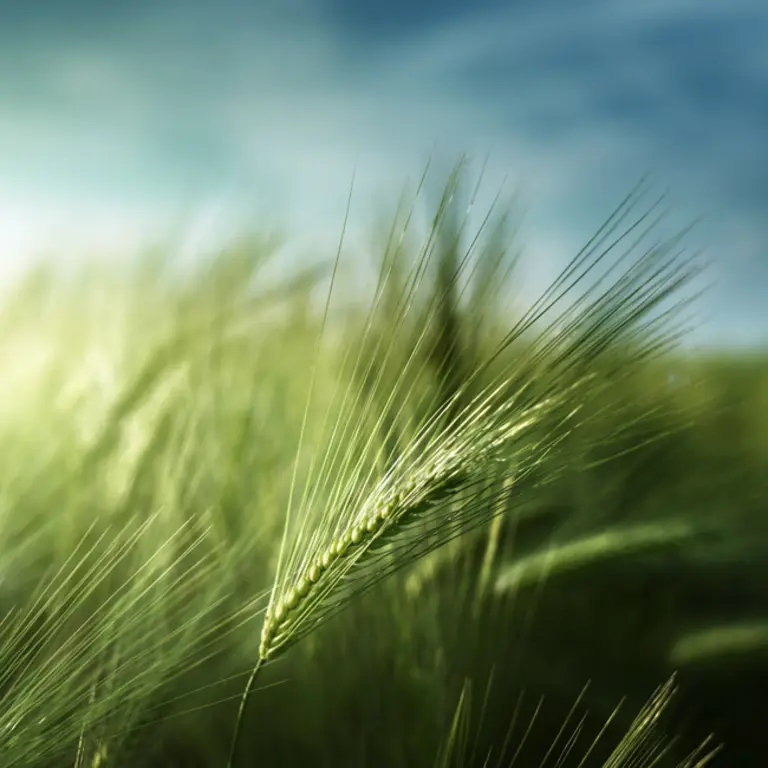1664 Blonde, the beer pioneering agro ecological farming practices, continues its transformation
- Innovation
- Malting

In 2026, 1 in every 10 beers will be brewed using sustainable malt in France
Since the beginning of the year, 50% of the malt used to brew 1664 Blonde beer has been sustainable malt, coming from the traceable and responsible barley supply chain that was co-created in 2022 by Brasseries Kronenbourg, Malteries Soufflet and Soufflet Agriculture (InVivo group). The next step in 2026 is for 1664 Blonde, which accounts for 1 in every 10 beers consumed in France, to be brewed using malt exclusively from that supply chain. This is an ambitious and truly transformative journey for 1664 and for Brasseries Kronenbourg, as the beer accounts for 40% of its volumes.
155,000 consumers have already accessed the digital app via a QR code to learn about the origins of their 1664 Blonde
Traceability is highly valued by consumers, who are curious to explore the journey of 1664 Blonde from barley field to bottle. Thanks to a bespoke blockchain system developed specifically for 1664 Blonde beer, consumers can scan a QR code on their bottles to access a digital platform and trace the beer's journey from barley field to bottle. No other beer on the market has taken its commitment to the agricultural and food transition so far and so transparently.

Consumers can use their phones to scan the QR code on the packaging and enter the batch number indicated to directly access the digital app, which has several sections. They can discover where the barley came from and when it was harvested and learn more about how the malt was manufactured, the different aspects of brewing and the commitments of the brand.
"For consumers of 1664, this is a unique and modern opportunity to learn about the production process and the expertise of the links in this sustainable and responsible supply chain (farmers, maltsters, brewers) with information and testimonials that embody this highly ambitious undertaking", says Anders Røed, CEO of Brasseries Kronenbourg.
The three sections that most grab consumers' interest
- Commitments to responsible barley cultivation, water conservation and sustainable transportation.
- Grain harvesting
- Brewing: not only can consumers learn about the various stages of the brewing process, but they can also discover details about the beer they're holding in their hands, such as brewing, malting and bottling dates.

This digital traceability solution therefore offers consumers a new way of connecting with the brand's commitments, in a visible way, to enhance the customer experience. The average visiting time for consumers is two minutes. The most popular time to visit and browse the digital platform is the weekend (there are higher scan rates on Saturdays and Sundays, particularly early in the evening).
A major project that already involves 120 farmers with a total cultivated area equivalent to 3750 rugby stadiums
This pioneering strategy in partnership with Malteries Soufflet and Soufflet Agriculture, which sees Brasseries Kronenbourg undertaking a massive transformation and making major commitments in terms of its malt supply chains, has been deployed with 1664 Blonde, which accounts for around 40% of the brewer's sales volumes and has a 10% share of the beer market in France.
The number of farmers in 2023 has increased almost threefold compared to 2022
For the 2023 harvest, the traceable and responsible barley supply chain, co-created for 1664 beer, comprised 120 farmers (compared to 45 in 2022, with a target of 250 farmers in 2026) across the Grand Est and Burgundy regions (particularly Champagne and Barrois-Côte d'Or) and Brie-Picardie, with a total of 20,000 tonnes of barley harvested from a cultivation area of 2765 ha (compared to 900 ha in 2022).
The traceable and responsible barley supply chain is part of the "Semons du Sens" sustainable supply chain strategy being led by the InVivo group
This strategy adds value to the output of partner farmers, whose crops comply with demanding agronomic and environmental specifications. "The partnership forged with Brasseries Kronenbourg for a responsible, traceable and sustainable barley-malt-beer supply chain is perfectly aligned with our desire to develop solutions that have a positive impact and which stimulate a true agro‑ecological transition. We are very proud, together with all our partner teams, to share these values and strong commitments with Brasseries Kronenbourg", says Guillaume Couture, CEO for EMEA and Global Key Accounts at Malteries Soufflet.
Ambitious specifications to guarantee sustainability and traceability in this responsible barley supply chain
The specifications ensure that farmers follow good agro‑ecological practices and guarantee optimal brewing and aromatic quality through the selection of the best barley strains. This enables us to:
- Protect the environment and, in particular, promote biodiversity through the good management of agro-ecological areas which contribute to the maintenance of a rich and varied fauna and flora.
- Work towards a reduced carbon footprint through the use of rational fertilisation methods based on annual soil analyses, or by promoting carbon capture and biomass production, thanks to cover crops.
The good agricultural and environmental practices implemented as part of this traceable and responsible barley supply chain are subject to external and independent monitoring. The partner farmers in the traceable and responsible barley supply chain record all growing operations, which are then consolidated in a centralised file. Collecting this traceability information allows us to:
- Calculate and monitor agri-environmental indicators for the supply chain at partner farms, in particular:
- The diversity of plant species cultivated on farms: on average, five different plant species were cultivated for the 2023 harvest. This diversity, combined with longer rotations, has numerous benefits, such as improved soil health and biodiversity.
- Areas dedicated to biodiversity reserves: 6% of agricultural land, with nearly 53 km of hedges, 236 hives and 23 nesting boxes.
- The amount of greenhouse gas (GHG) emissions: around 357 kg of CO2 per tonne of barley depending on the region and the yields (for the 2023 harvest). The reduction of emissions is facilitated in the field by the practices that have been implemented, including rational fertilisation and the use of multi-species cover crops.
Traceability data from the traceable and responsible barley supply chain make it possible to identify areas for improvement, the objective being to more sharply reduce the carbon footprint of upstream agriculture, which currently accounts for, on average, 20 to 25% of the carbon footprint of a beer in a glass bottle.
This traceability process does not end at the gate out of the field! It continues right up to Soufflet Agriculture's storage silos, which supply the Malteries Soufflet site in Strasbourg where sustainable malt is produced before being delivered to Brasseries Kronenbourg in Obernai, Alsace.
The impact of the agro-ecological transition key figures
The 2023 harvest at partner farms
- 120 farmers, 3 times more than in 2022
- 2765 ha of traceable and responsible barley cultivation areas — that's more than 3750 rugby stadiums!
- Five different plant species grown on average per farm:
- 6% of the land used, or an area equivalent to 1800 rugby pitches, is set aside for natural or semi-natural habitats such as green strips at the edges of fields, hedges and woodland
- 53 km of hedgerows, 3.3 times more than in 2022 (16 km)
- 20.6 ha of honey fallow on average per farm, equivalent to 28 rugby stadiums!
- 236 hives (compared to 169 in 2022), with around 7 million bees!
- 25 nesting boxes and 151 roosts (compared to 77 in 2022).
- DOCUMENT TO DOWNLOAD
Press release
PR-Soufflet-Agri-Malteries-Brasseries-Kronenbourg-1664-EN.pdf
